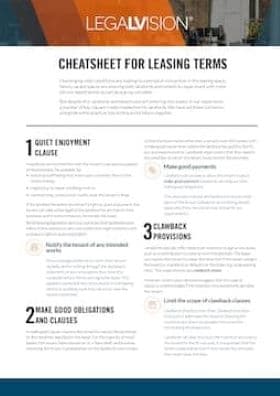Much like a lease, a licence agreement allows a landlord to permit another party to occupy their property for a specific purpose and for a set period of time. However, there are key differences between a lease and a licence agreement. In certain circumstances, a licence will be more appropriate than a lease. This article will set out the key:
- distinctions between licences and leases; and
- provisions and purposes of a licence.
Lease or Licence Agreement?
Both a lease and a licence give you the rights to use the property or premises in a way outlined in the agreement. The two key differences between leases and licences are that a lease gives you the following:
- exclusive possession over property; and
- proprietary interest.
Exclusivity
If you have exclusive possession of the property, you can use and occupy the premises exclusively. For example, someone with exclusive possession controls who enters or exits the property. A lease agreement grants exclusive possession.
Unlike a lease agreement, a license agreement grants only non-exclusive possession.
A common way to determine this is whether the area that is being occupied has physical boundaries (e.g. four walls). If this is the case, you will usually need a lease. On the other hand, if the area has no boundaries (e.g. the middle of a shopping centre), you will usually need a licence.
Proprietary Interest
A lease gives the tenant rights to the property, whereas a licence is only an agreement with the landlord to use the space. This means a tenant under a lease will receive specific rights and greater security than a licensee under a licence.
By comparison, if you licence a property, you secure the rights and privilege to use the property for an agreed purpose.
Ultimately, your license is still a contractual arrangement. This means the agreement to use the property under specific conditions is legally binding.
Key Provisions of a Licence Agreement
Although the terms of licence agreements vary, both parties will need to agree on the:
- specific licensed area;
- term; and
- fee for the licence.
Licensed Area
The licensed area must be distinguished clearly, as licences are usually given for areas that are not clearly defined by a boundary. One benefit of a licence is that, since they are more flexible than leases, the licensed area can be expanded or reduced easily if both parties agree.
Term
It is important to clearly set out the period during which the licensee is permitted to use the licensed area. While leases are usually long-term, a licence is suitable for a short-term arrangement (e.g., less than 6 months).
Licence Fee
Most licences will require the licensee to pay a fee in return for the use of the licensed area.
Continue reading this article below the formWhen Should I Use a Licence Agreement?
Whether a licence agreement might work for you will depend on:
- the specific deal between the parties; and
- factors such as the business and the location.
However, a few common circumstances are usually governed by a licence agreement.

This cheat sheet explains the key clauses you need to be aware of as a landlord in a lease agreement.
Key Takeaways
A licence agreement can be a convenient way for a landlord to allow another party to occupy its land under a more flexible arrangement. In many circumstances, a licence may be more suitable than entering into a lease.
If you are considering entering into a licence agreement, our experienced leasing lawyers can assist as part of our LegalVision membership. For a low monthly fee, you will have unlimited access to lawyers to answer your questions and draft and review your documents. Call us today on 1300 544 755 or visit our membership page.
Frequently Asked Questions
Both a lease and a licence give you the rights to use the property or premises in a way outlined in the agreement. The two key differences between leases and licences are that a lease gives you the following exclusive possession over property and proprietary interest.
Whether a licence agreement might work for you will depend on the specific deal between the parties and factors such as the business and the location. However, a few common examples to use a licence agreement is for franchises, pop up shops, shared premises, pre-lease commencement period, co-working spaces and car parking spaces.
We appreciate your feedback – your submission has been successfully received.











